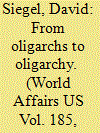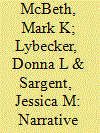| Srl | Item |
| 1 |
ID:
137679


|
|
|
|
|
| Summary/Abstract |
What motivates changes in energy policy? Typically, the process begins with a notable exogenous event, a shock. Often, the shock leads to what is perceived to be a crisis. This review essay surveys theories of crisis policymaking from the social science literature and considers their application to changes in energy policy. Two cases—one from the U.S., the other from Germany—are examined in more detail from the standpoint of the theories discussed. Suggestions are made for improving energy policy analysis in the future.
|
|
|
|
|
|
|
|
|
|
|
|
|
|
|
|
| 2 |
ID:
186385


|
|
|
|
|
| Summary/Abstract |
Drawing heavily on theories about Russia's informal politics, American sanctions were designed to change Russian foreign policy by exploiting political conflict among oligarchs and the state elite; however, after nearly eight years of sanctions, Russian elites seem more united than ever. I propose that Russia's oligarchs—the ruthless self-interested economic elite in Russia's informal political system—might sometimes act as a cohesive oligarchy, particularly when their wealth is threatened from external rather than domestic sources, as has been the case under Western sanctions. Through an in-depth case study on the design and outcome of sanctions, this article seeks to develop a more dynamic theory of Russia's informal politics and explain the apparent cohesion among state and economic elites since 2014 as the result of a politics of wealth defense induced by Western sanctions.
|
|
|
|
|
|
|
|
|
|
|
|
|
|
|
|
| 3 |
ID:
186873


|
|
|
|
|
| Summary/Abstract |
Understanding the reasoning behind diverse views grows empathy and can help strengthen democracy. This study examines narratives and their influence on individuals, to see if individuals only empathize with narratives from those with whom they share identity. Using an experimental design, we test empathy with working class climate change narratives. Results showed participants who agreed with anthropogenic climate change, who were given both evidence and a narrative, empathized with the narrator (either an organic farmer or a mechanic) that told a pro-climate change narrative. The greatest empathy was for the mechanic telling a pro-climate change narrative. Conversely, participants who did not agree with human-caused climate change and who were given evidence without narrative had more empathy for the organic farmer (over the mechanic) who told a pro-climate change narrative. Overall, we found some identity issues negatively influenced empathy, but we also found examples where individuals moved beyond their identity.
|
|
|
|
|
|
|
|
|
|
|
|
|
|
|
|